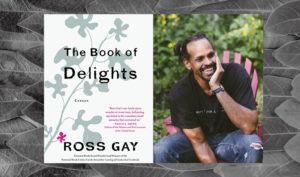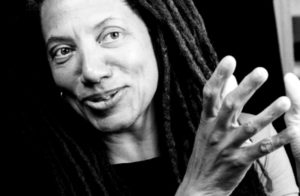Emily Ellison
Emily Ellison is a second year MFA poet at Texas State University, where she also works as a Teaching Assistant for their English faculty. Her work has appeared in Southword, After the Pause, and Haiku Journal, and is upcoming in several places. Emily lives in San Marcos, Texas with two cats and an abundance of plants (withering at the moment).

Content by Emily Ellison

Interviews,
The Truth of Beauty: An Interview with Erika Sánchez
BY Emily Ellison
I feel like I’ve inherited these traumas in some ways. I also think about metaphysical borders and spiritual borders and emotional borders . . . It’s not just the physical Mexican-American border—it’s much more than that.

Arts & Culture, Field Notes,
Decorum and Dare: Crafting the Interview’s Energy
BY Emily Ellison
Most people want to be heard. The interview, however daunting that term may seem, is essentially just a conversation in which both participants agree to dance without looking away, fielding the stumbles and rises.

Interviews,
Reviving the Beauty of a Nightmare: An Interview with Carmen Maria Machado
BY Emily Ellison
But it’s okay to wait, to try to find the right language and to find the right word. Because it isn’t enough to just transfer the pain of your body to the page: it has to be interesting, it has to beautiful, it has to do something for the audience or else it’s just secondhand pain.

Interviews,
With Our Mouths Open: An Interview with Sarah Gambito on Food and Lyrical Sweetness
BY Emily Ellison
I feel like we’re in such tumultuous times right now, and we need to uphold the linked roles of artists and audience—so how do we activate each equally, right? I’m less interested in the how the artist performs, where there’s this sort of passivity in the audience—not that that’s not a lovely thing, it’s a lovely thing. But I’m interested in how you get the audience to act towards, in some ways, what it is you’re doing.

Interviews,
The Blues of Grace: An Interview with Lauren K. Alleyne
BY Emily Ellison
You know the “poetry noise” people make—it’s like, “Oh” [released breath]. I feel like that’s the sound of the poem connecting; that’s the sound that these words have landed somewhere, and you’ve received them. That exchange, or possibility of exchange, between a poet and poem or a reader and listener—I think that’s what grace is made of sometimes.

Interviews,
In Pursuit of Pursuit: An Interview with Karen Olsson
BY Emily Ellison
I think with novel writing or narrative book writing in general, you have to have a journeyman approach. You cannot expect to be inspired through three hundred pages of prose. My attitude is just to go to work in the morning, clock in, and sit down there, because often it’s when you’re not inspired and you make yourself sit there that something happens you didn’t think was going to happen.

Reviews,
Wakes of Joy: On Ross Gay’s “The Book of Delights”
BY Emily Ellison
Gay declares every day an occasion to commemorate, similar to how the sun, when rising, also beams. Delight, he says, “suggests both ‘of light’ and ‘without light.’ And both of them concurrently is what I’m talking about. What I think I’m talking about. Being of and without at once. Or: joy.”

Interviews,
“The Mantle of Daughter”: A Discussion of Ancestry with Nikky Finney
BY Emily Ellison
And so, I’m a daughter of Toni Morrison, though not bloodline; but kinship-wise, and culturally, we are akin. I have a responsibility—to not necessarily say what she has said about being a daughter but to recognize my place in that continuum and welcome other daughters of all cultures into that—because who celebrates that except your family?

Interviews,
To Lie Down in the Field of What We Do Not Know: Interrogations of Epistemology with Robert Wrigley
BY Emily Ellison
Human life is invested in epistemological difficulties—just finding your ass with both hands these days is a challenge. But I think that nature, if we involve ourselves in it, if we just spend time [deeply inhales] looking at trees, smelling rocks… I like to crawl, I like to lie down in the woods a lot, I do that a lot, which has made me famous to the animals and my neighbors too.

Interviews,
Breaking the Borders of the Artist: An Interview with Fernando A. Flores
BY Emily Ellison
Whenever I’m writing, I have a “different brain.” As a writer, my main goal is to protect that first brain which is the first-draft-brain. And I just have to let this brain get from beginning to end. After that, I can do whatever I want with the page. That’s how I approach my work now.

Interviews,
The Art of Reconstruction: Cyrus Cassells in Conversation with Tyehimba Jess
BY Emily Ellison
First off, for me, sonnets are great for telling stories. A crown of sonnets can tell a great story. And I’m pretty much a storyteller. Secondly, folks in the 19th century loved sonnets. They dug Shakespeare, it was a familiar form. So, in a psychological or spiritual way for connecting with the people in the book, they were an avenue for making that happen.
